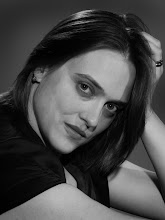On days like today, I sit back a bit and wallow in the gracious luck that has allowed me the opportunity to work with some of the most brilliant directors, conductors and singers in the business. They're not all famous, though some have often-whispered names, but so many of them are working tediously and tenaciously to change the face of opera.
There is a tradition of grand opera that requires nothing more from the singer than to swirl their capes appropriately, find the center of their light, and sing. I could just as easily have begun my career (and continued it) with a series of old-school park-and-bark directors who gave me tools in the "grand tradition" and very little ability to see beyond them.
My luck came from starting my directing career learning from directors who believe that opera singers are telling a story as much as any actor in a straight play. They have character motivation that drives their action, they must know what they are saying in order to emit some sort of believablity, and the story and visual effect of the opera is as important as the beautiful sounds coming from the performer's mouths.
Actually, in the 20-some-odd productions I've done in my short career, I've dealt with very few directors from the former tradition. I've been infinitely lucky to learn from brilliant minds who recognize that the story is told in the music; composers are usually deliberate in their musical choices so that the action is implied by the very sounds the orchestra and singers are making. By using that idea and by forcing the singers to truly understand every word that comes out of their mouth, they are building a production that sounds beautiful, looks beautiful and makes you think at the same time.
I want to direct like that.
I'm working with one such director now. She had a talk with our supers (our SUPERS!) tonight about how they should work a particularly difficult entrance. The entrance was hard not only for its precision timing but for what it was trying to convey as well. Our maestro went through the basic mechanics and then our director went into a long, moving speech about what the entrance was conveying, what they should be thinking about as they come in, where they should put their passion and thoughts throughout the entire musical figure. We started, they did it, and it blew us all back in our seats.
I get asked all the time whether I would prefer someone with a perfect voice or someone who is a brilliant actor. Of course, my first answer is that I want them both. That combination doesn't happen often however, and so I always end up saying, the latter. I certainly need the voice to be capable of singing the part with ease, but it's the passion behind the words that makes someone interesting to listen to. Sit down and listen to Maria Callas. Her voice was far from perfect, but she means EVERY word she says, and you know it, and you love her for it.
There are a couple of directors I work with on a semi-regular basis from whom I don't think I could ever stop learning volumes every time I sit next to them at the front of the room. Thank god I've been lucky enough to fall under their incredible tutelage.
Subscribe to:
Post Comments (Atom)

No comments:
Post a Comment